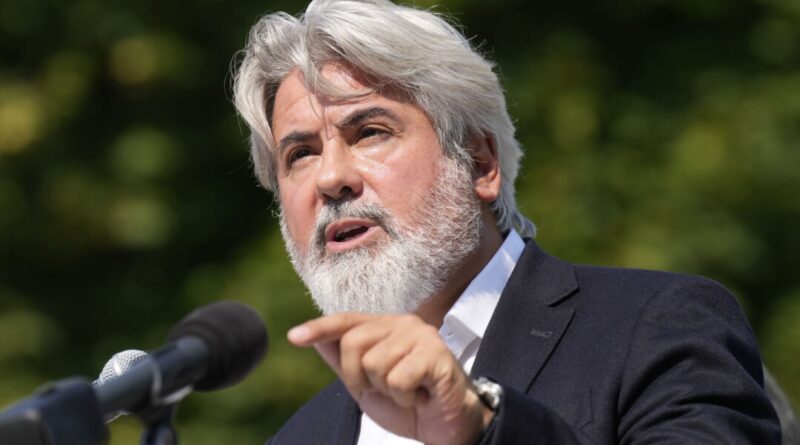Quebec Liberals Face Decision Time as Leadership Race Begins Monday
As the federal Liberals prepare to choose Prime Minister Justin Trudeau’s successor, another Liberal leadership race is getting underway in Quebec this week.
The stakes are high for the Quebec Liberals, who have been in the political wilderness for years, with dismal polling among francophone voters. Candidates and observers say the party needs to broaden its appeal beyond Montreal if it’s to have any chance of forming government in the 2026 provincial election.
The campaign will unfold in the shadow of the race taking shape in Ottawa. And with Trudeau’s former Quebec lieutenant, Pablo Rodriguez, the likely front-runner, the Quebec Liberals will have to set themselves apart from a federal party in turmoil.
“Let’s face it,” said political analyst Karim Boulos. “It’s not a great time to be a Liberal.”
The Quebec Liberal Party is the province’s oldest political brand and the party that has spent the most time in power. But the Liberals suffered their worst defeat in decades in the 2018 election that swept François Legault and his conservative-leaning Coalition Avenir Québec into office. Then in 2022, they fared even worse.
They currently hold just 19 of 125 seats in the provincial legislature, mostly in and around Montreal. The concentration of Liberal voters in the city allowed them to hang on to official Opposition status.
“The Quebec Liberal Party is at a crossroads right now,” said leadership candidate Charles Milliard, the former head of the federation of Quebec chambers of commerce. “I think the party needs a breath of fresh air and a generational renewal.”
The race, which officially begins Monday, could stir up much-needed excitement for the party. Rodriguez, who held a number of cabinet portfolios in Ottawa, announced his bid for the leadership in September. Former Montreal mayor Denis Coderre has also said he will run.
But attempts to attract another heavyweight, federal Innovation Minister François-Philippe Champagne, have so far not borne fruit, with Champagne considering a run for the federal leadership.
Milliard, 45, said the party needs to steer away from identity issues, including secularism and language, that have been a major feature of Legault’s time in office. He plans to run a campaign on “bread-and-butter” matters like health care, education and public finances.
“The Quebec Liberal Party is the only political party in Quebec that can talk to all Quebecers,” he said. “In recent years, the CAQ and the Parti Québécois have demonstrated that they can be very divisive.”
The Liberals have struggled to mount a compelling answer to the CAQ, which has positioned itself as the party of the economy, historically Liberal turf. As Legault has said, his promise not to hold a referendum also means the Liberals no longer have a “monopoly of being against sovereignty.”
The party, which hasn’t had a permanent leader since 2022, has so far not managed to capitalize on Legault’s recent decline in the polls. Instead, the sovereigntist Parti Québécois has been leading for more than a year.
Danielle Pilette, an associate professor at the Université du Québec à Montréal, said the party needs to “reestablish the Quebec Liberal trademark” as the best option for managing the economy, particularly in the face of president-elect Donald Trump’s tariff threats.
Boulos said the federalist Quebec Liberals will also have to navigate the current nationalist sentiment in Quebec. “The reality is, you wouldn’t get elected today in Quebec if you say that you’re a federalist,” he said.
Milliard said he considers himself “nationalist first,” but said Quebec “comes out a winner when Canada works well.” The Liberal party, he said, is both nationalist and federalist.
Milliard is a political novice, and in Rodriguez he will be up against an experienced politician who was first elected to the House of Commons in 2004. Rodriguez, 57, has pitched himself as a unifier and is considered the candidate to beat. Still, he risks being seen as yet another Liberal from Montreal. “Is he capable of sparking a major movement in the regions?” asked Pilette. “That’s unclear to me.”
Rodriguez, who declined an interview request, will also have to contend with the baggage of nine years with a federal Liberal government that is now deeply unpopular. In November, rival candidate Frédéric Beauchemin accused him of being part of a government “that spent like drunken sailors.”
Beauchemin, apparently, has since had a change of heart. Two sources have told The Canadian Press he will announce Monday that he’s dropping his leadership bid and throwing his support behind Rodriguez. He was the only sitting member of the provincial legislature in the race.
Rodriguez and Milliard both have endorsements within the Liberal caucus, but Milliard has considerable support from the party’s youth wing. Among all the candidates, Rodriguez likely has “the best shot at becoming premier,” said Boulos, a lecturer at Concordia University. But first he has to win over provincial Liberal members. “That’s the challenge,” he said.
Coderre, who was first to announce a leadership bid last June, has been plagued by headlines about how he owes roughly $400,000 to the federal and provincial tax agencies. In a December statement on Facebook, he said his tax problems would be resolved by January. He did not respond to interview requests from The Canadian Press last week.
Tax lawyer Marc Bélanger is also running for the leadership. To date, there are no women in the race, which ends in June with the election of a new leader.





